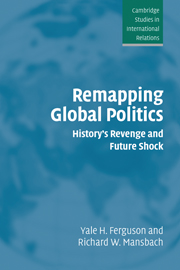Book contents
- Frontmatter
- Contents
- Preface
- Acknowledgments
- 1 Postinternational politics
- 2 Theory and method
- 3 Political space and time
- 4 States and other polities
- 5 Identities in a postinternational world
- 6 A postinternational world economy
- 7 War in a postinternational world
- 8 Technology and change
- 9 The future
- Index
- CAMBRIDGE STUDIES IN INTERNATIONAL RELATIONS
4 - States and other polities
Published online by Cambridge University Press: 22 September 2009
- Frontmatter
- Contents
- Preface
- Acknowledgments
- 1 Postinternational politics
- 2 Theory and method
- 3 Political space and time
- 4 States and other polities
- 5 Identities in a postinternational world
- 6 A postinternational world economy
- 7 War in a postinternational world
- 8 Technology and change
- 9 The future
- Index
- CAMBRIDGE STUDIES IN INTERNATIONAL RELATIONS
Summary
Myriad polities have emerged, declined, and substantially vanished throughout history, and the theme of continual change among political communities has been a perennial one in political philosophy. Aristotle described the growth and contraction of political associations; Machiavelli was preoccupied by the expansion and decline of princely realms; and Hobbes and Rousseau employed the imaginary but provocative metaphors “state of nature” and “contract” in order to explain the conditions of political birth. More recently, Samuel Huntington wrote of civilizations that they “are dynamic; they rise and fall; they merge and divide; and as any student of history knows, they also disappear and are buried in the sands of time.”
All polities are evolving (“becoming” in our terminology) and, while some endure, none lasts anything like “forever.” Yet both individual polities and polity types rarely disappear completely; rather, they remain as a part of the world's “living museum,” sometimes as an historical oddity or an exhibit that sooner or later may go back on show or be reconstructed in one fashion or another. At any given time, individual polities of a particular (ideal) type differ substantially in their characteristics and capacities, and exercise influence or control only within limited domains. And, as we have seen, domains often overlap in whole or in part, and polities thus regularly share some political space.
In this respect postinternational thinking is antithetical to much of the theorizing about global politics, especially realism and neorealism.
- Type
- Chapter
- Information
- Remapping Global PoliticsHistory's Revenge and Future Shock, pp. 107 - 142Publisher: Cambridge University PressPrint publication year: 2004

